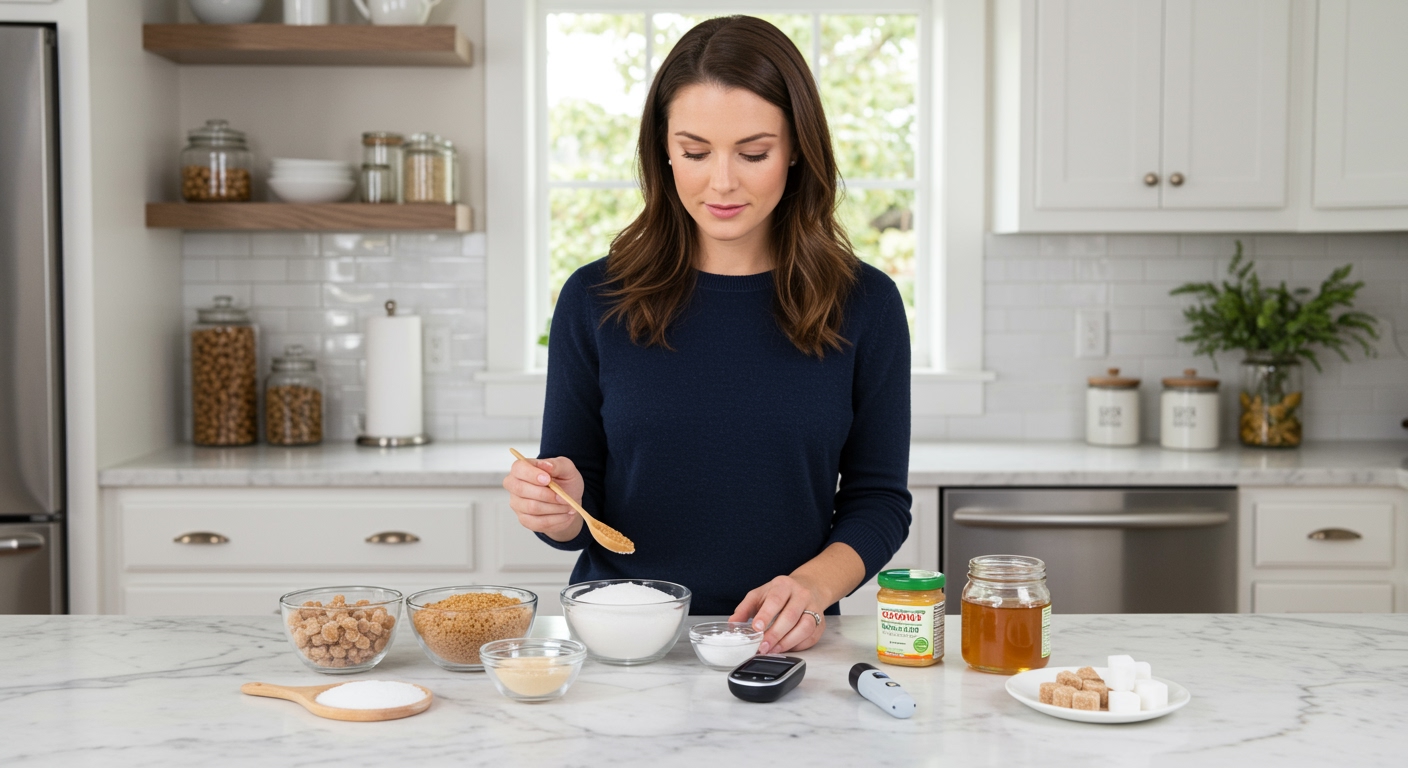✪ Key Takeaway: Coconut sugar offers minimal benefits for PCOS and can still spike blood sugar levels just like regular sugar.
Introduction
You walk down the health food aisle and see coconut sugar marketed as a natural, PCOS-friendly sweetener.
You might be wondering if switching to coconut sugar could help manage your PCOS symptoms and improve your insulin sensitivity.
Hi, I am Abdur, your nutrition coach and today I am going to explain whether coconut sugar can truly help with PCOS or if it is just another marketing myth.
What Makes Coconut Sugar Different From Regular Sugar?
Coconut sugar comes from the sap of coconut palm trees, unlike regular sugar which comes from sugar cane or sugar beets.
The production process involves collecting the sap, then boiling it until the water evaporates and crystals form.
This natural process preserves small amounts of minerals like potassium, magnesium, and zinc that are completely absent in refined white sugar.
Coconut sugar also contains trace amounts of inulin, a type of fiber that can slow down glucose absorption in your digestive system.
However, these mineral amounts are so tiny that you would need to consume massive quantities to get any meaningful nutritional benefit.
The inulin content is also minimal compared to what you would get from vegetables like onions or garlic.
✪ Fact: Coconut sugar contains about 70-80% sucrose, making it nearly identical to table sugar in composition.
How Does Coconut Sugar Affect Blood Sugar Levels?
The glycemic index of coconut sugar ranges from 35-54, which is lower than white sugar at 65.
This means coconut sugar might cause a slightly slower rise in blood glucose compared to regular sugar.
However, this difference is not significant enough to make coconut sugar a safe choice for people with insulin resistance.
Your pancreas still needs to produce insulin to handle the glucose load from coconut sugar.
Women with PCOS already struggle with insulin resistance, meaning their cells do not respond properly to insulin signals.
Adding any form of concentrated sugar, including coconut sugar, can worsen this insulin resistance over time.
✪ Pro Tip: Monitor your blood glucose 1-2 hours after eating coconut sugar to see your individual response.
Can Coconut Sugar Help With PCOS Symptoms?
There is no scientific evidence showing that coconut sugar provides any specific benefits for PCOS management.
PCOS symptoms like irregular periods, weight gain, and acne are primarily driven by hormonal imbalances and insulin resistance.
Coconut sugar still contributes to blood sugar spikes that can worsen insulin resistance, a key driver of PCOS symptoms.
The small amounts of minerals in coconut sugar are not enough to impact hormone production or metabolic function.
Women with PCOS benefit most from stable blood sugar levels throughout the day, which coconut sugar cannot provide.
Research shows that reducing overall sugar intake, regardless of the source, helps improve insulin sensitivity and PCOS symptoms.
✪ Note: Natural does not automatically mean better for PCOS – your body processes all sugars similarly.
What Are Better Sweetener Options For PCOS?
Stevia and monk fruit are zero-calorie sweeteners that do not affect blood sugar or insulin levels.
These natural sweeteners allow you to enjoy sweet flavors without triggering the metabolic problems associated with sugar.
Erythritol is another option that has minimal impact on blood glucose and provides sweetness without the calories.
Fresh fruits can satisfy sweet cravings while providing fiber, vitamins, and antioxidants that support overall health.
The fiber in whole fruits slows down sugar absorption and prevents the rapid blood sugar spikes seen with processed sweeteners.
Cinnamon and vanilla extract can add natural sweetness to foods without any impact on blood sugar levels.
✪ Pro Tip: Gradually reduce all sweeteners to retrain your taste buds and reduce sugar cravings naturally.
Should You Avoid Coconut Sugar Completely With PCOS?
You do not need to completely eliminate coconut sugar, but you should treat it like any other added sugar.
Occasional small amounts in homemade treats are unlikely to cause significant problems if your overall diet is balanced.
The key is understanding that coconut sugar is not a health food and should not be consumed regularly or in large quantities.
Focus on getting your carbohydrates from whole foods like vegetables, fruits, and whole grains that provide nutrients along with energy.
If you choose to use coconut sugar, pair it with protein or healthy fats to slow down absorption and minimize blood sugar spikes.
Track your symptoms and blood sugar response to determine your individual tolerance level.
✪ Fact: The American Heart Association recommends no more than 6 teaspoons of added sugar daily for women.
The Bottom Line
Coconut sugar is not a miracle solution for PCOS and offers minimal advantages over regular sugar when it comes to managing your symptoms.
The best sweetener for PCOS is the one you use least often because stable blood sugar is your most powerful tool for hormone balance.
I would love to hear about your experiences with different sweeteners or any questions you have about managing PCOS through nutrition in the comments below.
References
At NutritionCrown, we use quality and credible sources to ensure our content is accurate and trustworthy. Below are the sources referenced in writing this article:
- Casa de Sante: PCOS Sugar Alternatives
- PCOS Diva: Sweeteners for PCOS
- PCOS Nutrition: Artificial Sweeteners and PCOS
- PMC: PCOS and Dietary Management





